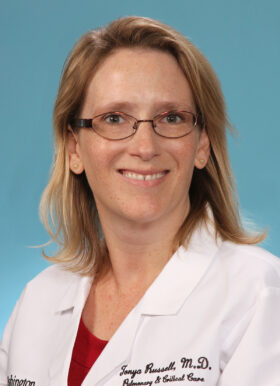Tonya Russell, MD

Tonya Russell, MD, is a specialist in pulmonary and critical care medicine. Her areas of interest include interstitial lung disease (ILD), sleep medicine and sleep disorders. She is co-director of the ILD clinic that allows collaboration with other specialists in order to better diagnose patients and determine the best treatment options.
Dr. Russell sees patients at:
- Jacqueline Maritz Lung Center, Center for Advanced Medicine, 4921 Parkview Place, 8th floor, Suite B.
Please call 314-454-8917 for an appointment.
- Washington University Sleep Medicine Center, Center 40 Building, 1600 Brentwood Blvd., Suite 600.
Please call 314-362-4342 for an appointment.
What happened in the course of schooling to influence you to choose your specialty?
As a 4th year medical student at the University of Florida, I did a clinical rotation in the pulmonary division. The physicians in that department were fantastic and dynamic teachers. I liked the physiology of the specialty, as well as the type of patients that were treated. It was at that point I became interested in pulmonary critical care medicine.
What brought you to Washington University?
I thought I would just be here for three years of residency training, but I ended up staying for my fellowship and eventually became faculty. There are so many outstanding physicians at Washington University within pulmonary medicine, plus the other divisions of internal medicine, radiology, pathology and surgery. We also get to see such an amazing scope of patients — it’s hard to leave a place like this.
Which aspect of your practice is most interesting?
We just recently started an interstitial lung disease (ILD) clinic — one of my colleagues, Dr. Adrian Shifren, is the director and I’m the co-director. We’ve always seen patients with ILD, but they have been divided among the various clinics. With the ILD clinic, we are able to collaborate with thoracic radiologists, pulmonary pathologists and rheumatologists to treat our patients in a multidisciplinary fashion. This allows us to discuss these complicated cases in a group setting in order to diagnose and decide on the best treatment options for our patients.
What is interstitial lung disease (ILD)?
ILD is a broad term that covers many different conditions. It’s basically inflammation and scarring within the lung. It can be anything from idiopathic (unknown cause) pulmonary fibrosis to conditions related to rheumatoid arthritis, myositis or lupus where inflammation can develop in the lungs. ILD covers a broad scope of patients, and their disease can often be very complex.
There are many different types of ILD, however the one people hear the most about is idiopathic pulmonary fibrosis or IPF. ILD covers other areas like rheumatologic-related lung disease or sarcoidosis.
Sometimes the type of ILD is not always clear at the outset, so we have to review a lot of medical records, pathology and radiographic imaging to make an accurate diagnosis. This is where the multidisciplinary discussions at the ILD conference can be very helpful.
Does the treatment vary?
Yes, treatment varies widely, depending on the specific ILD diagnosis. In the fall of 2014, two drugs received FDA approval for IPF. Until then, there was no approved therapy for idiopathic pulmonary fibrosis. The drugs are not perfect by any means, but they seem to slow progression of the disease – and we now have something to offer IPF patients.
For ILD conditions related to rheumatologic disease, the treatment is usually immune suppression, because it’s the immune system that is driving the inflammation.
What new developments in your field are you most excited about?
The biggest excitement has been generated by the two IPF drugs that recently received FDA approval, which I just mentioned. Before these two drugs, we could only offer supportive care — oxygen, pulmonary rehab, or referring a patient for lung transplant if he or she was a candidate. The treatments may slow the progression of the disease — something that previously we were not able to offer our patients with IPF. Again, the drugs are not perfect, so we are up-front about the limitations of the medications.
Where are you from?
I’m originally from Tampa, Florida — one of the few true Florida natives. I lived in Florida until I moved here for residency training, and have lived here ever since.
I was surprised to see that the summers are just as hot and humid in St. Louis as they are in Florida. But Florida does have better winters –as my father likes to remind me on a regular basis.
Is there a particular award or achievement that is most gratifying?
A few years ago, I won the Robert Senior Teaching Award for the division of pulmonary and critical care medicine, an award given by the fellows to a faculty member who they feel was an outstanding teacher for that year. It represents the ideals of Dr. Senior, a Washington University physician (now semi-retired), renowned clinician and scientist. It’s always nice to have your trainees recognize your efforts, and I was very proud to receive that award.
What is the best advice you’ve received?
The best advice was probably from my mother. She always told me that no matter what the situation, realize you can learn something from everyone you meet.
This is especially important in medicine. In order to offer advice to patients, we have to obtain information from them that helps us help them. We have to keep an open mind to realize that everybody’s circumstances, backgrounds and challenges are different. I always hear her voice in the back of my head when I’m talking to my patients.
If you weren’t a doctor, what would you like to be doing?
I would probably be an architect. The creativity and detail-oriented nature of architecture always appealed to me. That would be my alternative career.